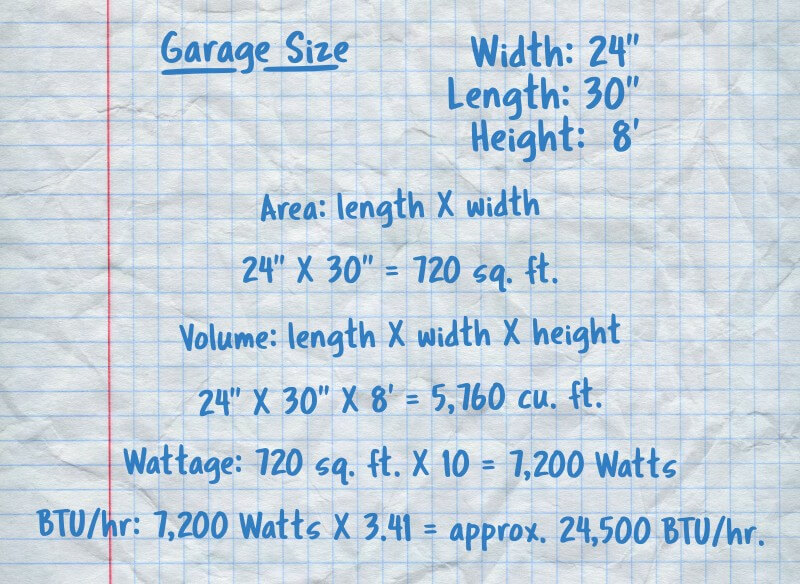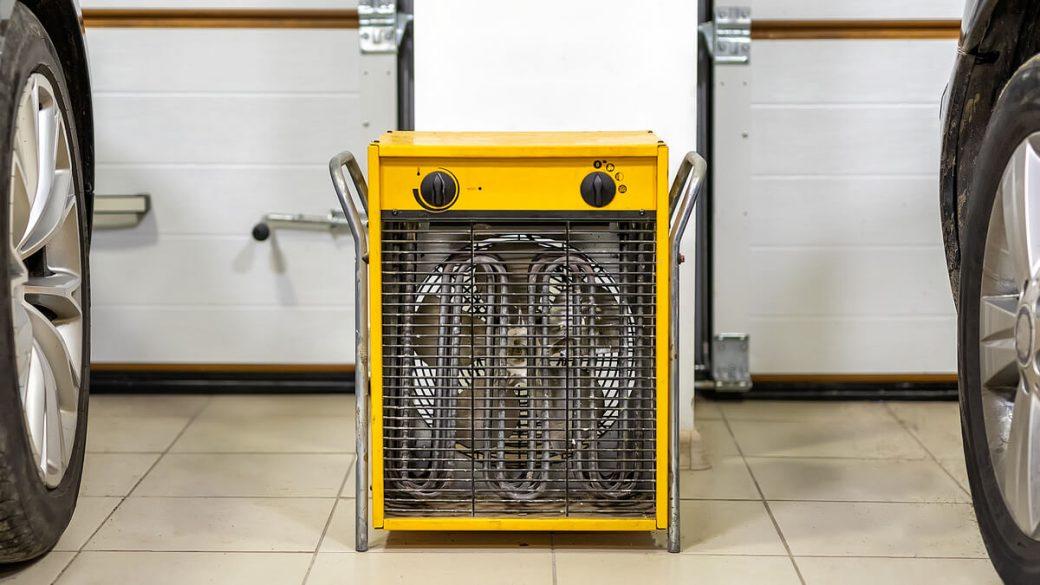Nobody likes working in freezing conditions, and simple fixes like thin garage door insulation sheets just don’t cut it when the temperatures drops seriously low. The only thing that will keep you comfortably warm even in the most extreme temperatures is a garage heater.
But wait, it isn’t that simple.
Garage heaters come in different shapes and sizes, and that’s what makes all the difference. To get the best possible results, you need to choose a heater of the right size for your garage heater and find the right balance between power and efficiency. To help you with that, we have created this article explaining the process so you can make an informed decision—and not regret your purchase.
How to Estimate a Heater’s Size for a Garage
Before we answer the big question, there are a few things you need to know.
For a start, the physical size of a heater doesn’t play a significant role compared to some other more important parameters. A large heater will not necessarily heat your garage quicker than a smaller one. What you really need to look for is heating capacity.
Put simply, the heating capacity of a heater depends upon factors like its British Thermal Unit (BTU) output and wattage. But, before we get to the numbers, we need to determine what we’re dealing with here.
Start by calculating your garage’s approximate volume (length X width X height) and square footage (length X width). Assuming you have a two-car garage measuring 24′ X 30′ with an 8′ ceiling, the total volume of this garage would be 5,760 cu. ft., while square footage is 720 sq. ft.
So, how is a garage heater’s required size estimated then?
Garage heaters are rated in Watts, and the higher the wattage, the more powerful it is. To calculate the appropriate wattage for a standard residential garage, we recommend a simple formula: 10 Watts per square foot—as simple as that.
Using the example garage mentioned above, multiplying the square footage (720 sq. ft.) by 10 gives us 7,200 Watts, which is the ideal recommended wattage to look for here.
Next, let’s talk about the British Thermal Unit (BTU). In simple terms, BTU is a unit used to measure heat. 1 BTU is the amount of heat required to raise the temperature of one pound of water up by one degree Fahrenheit. Once you have the required wattage, calculating the approximate BTU is highly straightforward. Since one Watt equals 3.41 BTU/hr, all you need to do is multiply the required wattage by 3.41. So in our cases, 7,200 Watts X 3.41 = approximately 24,500 BTU/hr.

Of course, keep in mind that our formula will provide a good enough estimation for standard-sized garages, but it is not perfect by any means. You need to consider several other parameters like your garage’s insulation, R-value, temperature change required, and geographical region to get a more precise estimate.
No need to mention that if your garage is two-story high or if you are looking to heat up a full-fledged auto repair shop or a warehouse, the height of the ceiling will also need to be taken into account.
Here is the formula to get a more accurate estimation:
(Insulation R-value * Volume * Temperature difference)/1.6.
Choose the appropriate R-value based on your garage’s insulation, calculate your garage’s total cubic footage, and figure out the required temperature difference. Divide the final figure by 1.6, and you get the required BTU/hr value; divide that by 3.41 to get the estimated wattage you’ll need.
Types of Garage Heaters
Several types of heaters are available in the market, but not all are suitable for use in garages. While selecting the best garage heater for your garage, you need to consider several safety issues that may arise with some heater types. Your garage is a closed space with poor ventilation, so using kerosene heaters, for example, creates a significant fire hazard. To make sure things don’t go sideways, we think some heater types are simply better and more appropriate for garage use. Based on their power source, garage heaters can be classified into two main types:
Gas heaters
As the name suggests, gas heaters heat an area by burning combustible gas and emitting energy. Depending on the specific input fuel, gas heaters can be further divided into several sub-types. Some commonly used gases include natural gas, kerosene, and liquified petroleum gas such as propane, or butane.
Gas heaters work on the principle of radiation, wherein the gas mixes with air and burns, heating the surroundings. As hot air is lighter, it rises above, and the space around the heater is occupied by relatively colder air. The cold air will then get heated and flow upwards, allowing the cycle to repeat until the desired increase in temperature is achieved.
Gas heaters are rated in terms of BTUs, so make the appropriate calculations before going shopping. Also, depending on fuel and energy costs, gas heaters are considered cheaper to run and maintain.
Pros
- Cheap fuel costs
- Quick heating time compared to other types
- Dependable even in case of a power outage
- Higher heat output
- Uses less energy
Cons
- Require dedicated gas line for uninterrupted use
- Costly initial installation
- Heavy units
- Minor issues can have significant consequences if not dealt with
- Relatively dangerous than electric models
Electric heaters
Electrical heaters generate heat energy by resisting the flow of current. These heaters are relatively simple in construction as they house a central heating element or coil, and in some cases, a prop fan. As current passes through the coil, electrical energy converts into heat, and the surrounding becomes warmer. The fan’s job is to push the hot air outwards and make room for colder air, so the entire process repeats.
Since electricity is more expensive than gas in most parts of the United States, running an electric garage heater can cost up to 15% more compared to gas heaters. However, electric heaters are much safer as there is no open flame, and the coils can be tucked away behind railings.
Pros
- Comparatively cheaper to buy
- No complicated installation process
- No possibility of harmful gases leaking
- Much safer than gas-powered heaters
- Portable and lightweight units
Cons
- Won’t work in a power outage
- Electricity is more expensive than gas
- Some models require unique power outlets costing around $300-$500
Last Words
A garage heater can be an instrumental tool to maintain productivity even in the winter, and we hope this article has helped you decide on the right heater for your garage.
All that’s left now is for you to use the formulae and make the calculations to estimate the heater size necessary for your garage. Next, choose your preferable heater type and select a model that suits your needs and budget the best.
If you have trouble finding a suitable model, check out our “Best Kerosene Heater for Garage” and “Best Electric Garage Heaters” for further assistance.




![Best 240v Electric Garage Heater [2021 Reviews]](https://garagespot.com/wp-content/uploads/2021/09/Best-240v-Electric-Garage-Heater-2021-Reviews.jpg)






I think you really need a cubic feet calculation. Somehow the ceiling height must be configured in.
Yeah… just trying to see if people were paying attention… 😉😂
But more seriously, the calculation based on square footage is really just a rough estimate for standard residential garages…
If your ceiling is much higher than normal or if you run a repair shop, you’re much better with the calculation described a little lower in the text:
(Insulation R-value * Volume * Temperature difference)/1.6)
This method is a lot more precise but since most people may not be aware of their garages’ R-value, we thought it would be a good idea to suggest the easier method (10 Watts per square foot X 3.41)…
But yes, you are totally right — this will only give a ballpark estimate. It’s still much better than nothing for anyone with a regular 8′ high ceiling who doesn’t really know what R-value to input.
Of course, if you have a better method to calculate the right heater size for your garage, don’t hesitate to share it here and I’ll add it to the article right away! ✌